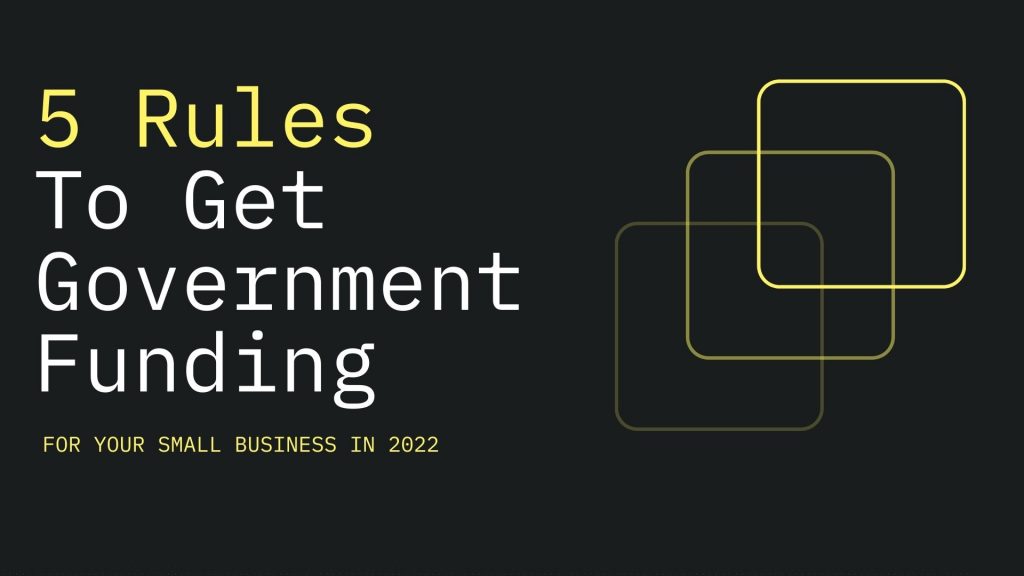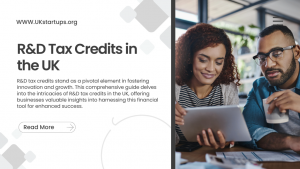5 Rules To Get Government Funding for Your Small Business (2022)
Category: Funding & Financing
Starting a small business in the UK in today’s economy is no easy task – so getting help from the UK government in the form of funding support would mean a lot, wouldn’t it?
The UK government has hundreds of available government funding schemes that are available to help small business owners succeed. These schemes are often provided in the form of government grants, government loans or tax breaks and credits.
While the funding options are available to all registered small businesses across the UK, not everyone is eligible.
There are certain steps and criteria that you as a small business owner must meet before you can secure the funds. These factors are what we call the 5 golden rules – or more so, 5 critical steps to securing the government funding for your business in 2022.
5 Rules To Get Government Funding for Your Small Business (2022)
The UK government provides funding to help small business owners succeed.
This funding comes from various levels of the British government, including the local government, regional offices as well as national level government.
The funding, as mentioned can come in the form of government grants, government loans, or tax options. Each one has its own benefits as well as disadvantages.
To ensure that you can successfully get any of these government funding options for your small business, the below 5 rules are what you should take into consideration:
Rule # 1: Have a solid business plan
Rule # 2: Ensure your financial statements are perfected
Rule # 3: Know what you need in terms of funding and how much
Rule # 4: Understand how to search the government funding options
Rule # 5: Be extra careful with the applications
Keep in mind that every single government funding programme is unique in its own way – so on top of these crucial steps, each programmes application criteria and requirements may vary. Take the needed time to review the funding scheme in detail before you apply.
Rule # 1: Have a solid business plan
Having a solid business plan can mean the difference between success and failure. This is even more true in 2022, in the post pandemic world.
Your business plan should be detailed and should explain your business models, what it is that you provide to the end user, who your end user is, what your market is, how you will make money, how you will grow the business and should explain your potential that the business has.
Government funding agencies will use the business plan as a way to evaluate your business potential and to help determine how much you may be eligible for, if any at all.
When putting your business plan together, keep it simple and prepare it in a way so that the reader can fully understand your business model.
There are a few ways to create a business plan:
- Use the Business Plan Builder Tool available via UKStartups.org
- Hire a professional to get the plan done for you (this may cost you quite a bit)
- Use free templates to try and piece it all together
No matter the source you use to create your plan, be sure that it covers the basics of what a business plan should contain and that it is focused on your funding goals.
Rule # 2: Ensure your financial statements are perfected
As you create your business plan, a big part of the plan will be your financial statements.
In certain cases, if your business is already operating, you should be keeping financial statements for tax purposes. You can attach these to your business plan to help the reader (a funding agency) determine the financial situation your busienss is in.
If however you are just starting your small business and this is a startup with no previous financial history – projections are acceptable and often recommended.
When projecting you’re financial, they are really smart guesses or estimates as to what your business may do financially speaking if all goes as planned.
While you may be conservative in your figures, you can also take the needed time to research the expenses your business may incur, in order to be successful.
By determining your expenses, the one time, startup and on-going, you will be able to determine a break-even point. From this point onwards, determining your sales potential should be simpler.
It is recommended to have 3-year financial projections in the form of a balance sheet, a cash flow statement, and a profit loss statement where possible.
If you get stuck on doing this for your business, be sure to reach out to a UKStartups expert for help and guidance.
Rule # 3: Know what you need in terms of funding and how much
Now that you have taken the time to develop your business plan and worked on your financials it will be a lot easier to determine what you need funding for and how much funding you really need.
By putting down your expenses and projections, you can use those figures to see where you fall short on capital. This can be turned into a funding requirement.
Any activities that you want to do with your business but you can’t afford due to lack of capital can be turned into a funding requirement.
There are various government funding agencies that will fund various business activities from hiring and training staff, purchasing tools, supplies, and equipment, to marketing costs, website development, renovations..etc
The best place to start is by figuring out what you really need to advance forward with your business.
A few tips when looking for funding:
- Don’t ask for too much (only ask for what you really must need and can’t do without)
- Only ask for funding that you need within the initial 3 to 6 months
- Always ask for 10 to 15% more than you need (as agencies don’t always give you what you ask)
- Start your funding search 2 to 3 months before you must have the funds (the process takes a while)
- Don’t ask for 100% of your expenses to be covered – but only those that you must have help with
Remember to always break down the funding needs you have into the specifics rather than asking for a lump sum – as this will allow you to apply for multiple funding options and give you a greater chance of success.
Once you have determined what you need funding for and how much – time to start looking for the options that are available to your business.
Rule # 4: Understand how to search the government funding options
The UK government has different levels of funding options which come from the local government offices, the regional as well as the National. In most cases, they are not connected and have very little to do with each other.
Some funding programmes will cover a certain type of expenses or funding needs, while others may cover multiple. Some programmes will fund only specific industries while some fund all – the same applies to the location your business is in – some fund a certain area, while others may have certain criteria that you have to fall under.
It is always important to remember that each funding agency is different and every single one has its own criteria you must follow in order to be eligible.
When starting your search, keep an eye on the following:
- Does the funding programme fund the industry you are in (some may fund multiple, or your business may fall into multiple industries)
- Does the funding programme cover the expenses you have?
- What is the maximum amount of funding you can ask (is it enough or is it too little)?
- Does the funding programme cover the location of your business or the region you are in?
- Are there other requirements you don’t meet?
The last thing you want to do is apply to a programme that you did not meet the criteria for and wait weeks at a time to hear back – and denied.
Read all of the rules, all criteria carefully and ensure that you can apply
If you need helo searching for funding programmes and knowing which options to choose – the Funding Database will help you locate all funding options available for 2022 and across the UK.
Remember that when applying for funding, the breakdown of your funding needs was done for a reason – so that you can apply to multiple funding programmes.
Rule # 5: Be extra careful with the applications
Once you have managed to find a funding programme that can help with one or all of your funding needs; the application process is the next step.
Nearly 80% of applications that are denied are often denied due to mistakes on the application forms. So this is definitely a step to be careful with and double, if not triple-check that your work is done correctly.
Be sure to read the requirements on each application and ensure that you are 100% meet the requirements and criteria.
Do not leave blank fields; do not forget to attach your business plan, your financials or to have a clear explanation of what you need the funding for.
If you have questions before you submit your applications – be sure to ask.
Once an application is submitted, it can take 2 to 6 weeks on average to hear back.
These 5 rules of how to get government funding for your small business are applicable for 2022 and by following them you will ensure your success with the process.





